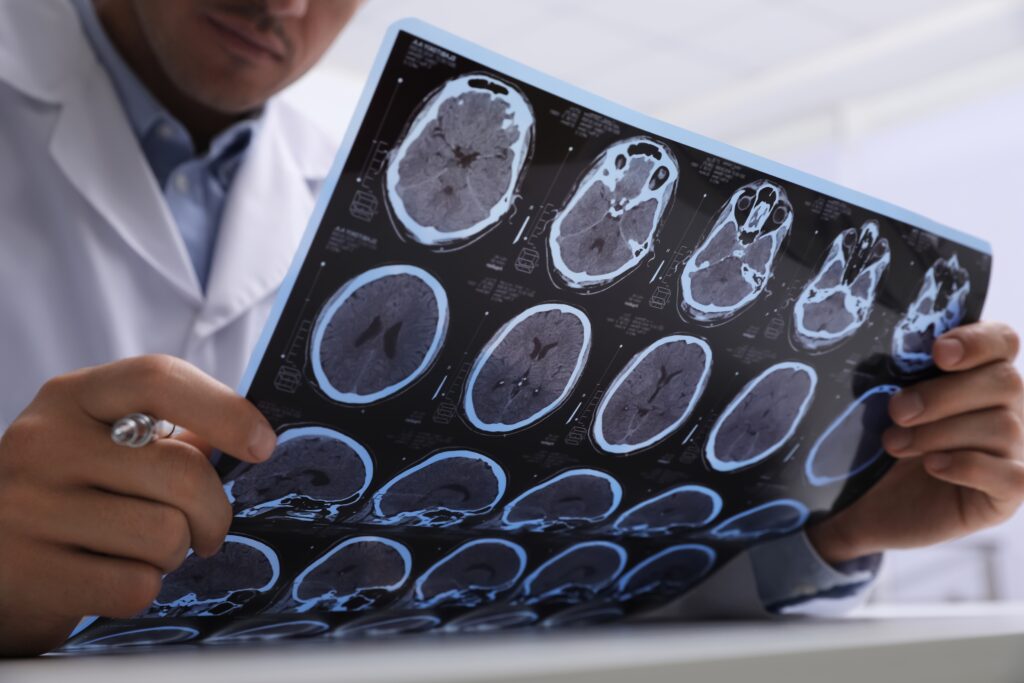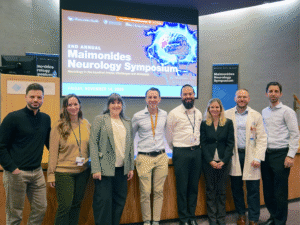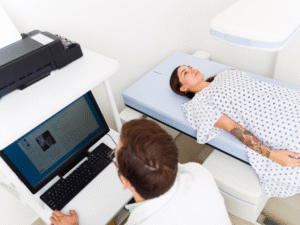Multiple sclerosis (MS) is a highly complex, unpredictable disease. The condition affects everyone differently. Because of this, neurologists must guide patients with possible MS through an exhaustive diagnostic process, and create unique, individualized treatment protocols designed to meet the specific requirements of each patient.
As the region’s only National MS Society-designated Center of Excellence, the Linda Morgante MS Care Center at Maimonides Medical Center is renowned for its care model. The distinguished center combines the most advanced treatment options with an integrative approach to patient care.
“It emphasizes a synergy between the latest in medical advancements and a collaborative care strategy, ensuring that each patient receives a holistic and tailored treatment experience,” said Jamie Nichols, MD, the Maimonides Health neurologist who recently joined the health system and leads the MS Care Center.
MS: A Difficult Diagnosis
Historically, identifying MS has been complicated because there’s no single test to detect it. Instead, doctors have relied on a patient’s medical history, MRI imaging and lumbar puncture (spinal tap) for diagnosis.
MS also shares multiple symptoms with other conditions like migraine and neuropathy. Patients can experience a wide variety of symptoms, but not everyone will experience every sign. Primary care physicians should consider referring patients to the MS Center if their patients mention a combination of these symptoms:
- Bladder problems
- Bowel trouble
- Dizziness
- Fatigue
- Memory problems
- Numbness or tingling
- Pain
- Stiffness or spasms
- Tremor
- Vision problems
An Expanded Approach to MS Care
Shared symptoms aren’t the only challenge to diagnosing and treating MS. Until recently, it’s been easily confused with some autoimmune conditions, such as myelin oligodendrocyte glycoprotein antibody disease (MOGAD) and neuromyelitis optica (NMO).
However, recent research over the past decade has revealed antibodies that distinguish these conditions from MS. And Dr. Nichols has the additional training in neuroimmunology needed to take a broader approach to caring for these patients.
“With this extra training, I am better equipped to tease these very complicated medical diagnoses apart, and even pick up on the little quirks or red flags that point to different autoimmune conditions that are often confused with MS,” she said. “This way, we’re able to ensure our patients receive the right diagnosis and give them the best treatment as early as possible.”
Comprehensive Care for MS
Several treatments exist for MS, and patients who come to Maimonides have access to all advanced infusion therapies, said Anne Ocello, NP, a neurology nurse practitioner who coordinates infusion services at Maimonides Cancer Center. Depending on their specific needs, patients can receive a variety of disease-modifying therapies.
Ocello is also taking additional steps to ensure patients have convenient access to new and emerging FDA-approved therapies including infusions, oral medications, and self-injectable medicines, with options for both in-office and at-home administration. Many infusions can be administered to patients at home, and for those that cannot be, Ocello provides care to patients at both the MS Care Center and Maimonides Cancer Center.
“We have an opportunity to arrange home infusions for maintenance therapies, which help patients to avoid major relapses,” Nichols said. “This is especially beneficial in bringing needed therapy to patients with MS who would otherwise have a difficult time traveling to an infusion center on a regular basis for maintenance therapy.”
Tackling a Complicated Condition Together
Dr. Nichols and the other neurologists at Linda Morgante MS Care Center are well-positioned to provide the highest level of care available.
As experts with specialized fellowship training in identifying and treating MS, Nichols and her colleagues work closely with a team of nurses, nurse practitioners and social workers to ensure they address each patient’s needs. The team meets weekly to discuss each patient, examine their imaging, review their treatment progress and results, and continually develop their personalized care plan.
“Having a specialty-trained neurologist alongside a committed nurse practitioner and social worker, regularly engaging with our patients, is truly remarkable,” Ocello said. “These frequent interactions allow us to ensure our patients receive all-encompassing care. What distinguishes us is our emphasis on collaboration.”
Along with achieving clinical excellence and individualized MS care, this team’s other major priority is providing compassionate care through shared patient-provider decision making, support of patient preferences, robust patient disease management education, and responsiveness to complementary alternative therapies.
MS is a uniquely challenging disease with no cure, therefore the MS team works tirelessly to help patients maintain a high quality of life through reducing relapses, managing symptoms, and slowing the disease’s progression with the most up-to-date clinical expertise and treatments. The breadth of Maimonides’ clinical services supports these patients’ care, with physical therapy, occupational therapy, and speech-language pathology services all available to patients with simplified referrals.
Learn about multiple sclerosis and other neurology care at Maimonides Health or call (718) 283-7470 to refer a patient.




